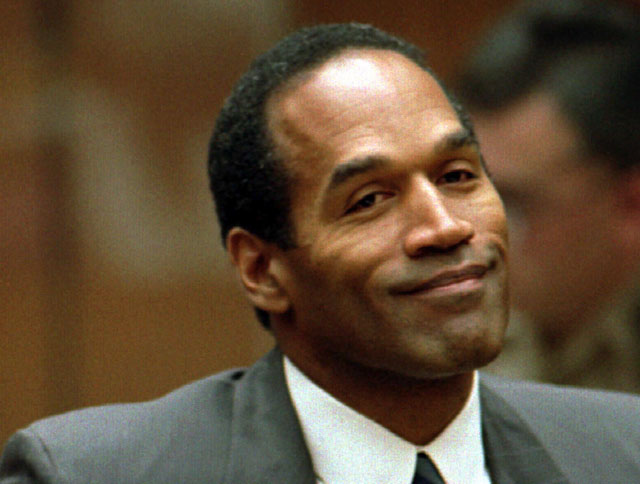The murder trial of O.J. Simpson was resurrected in 2016. Ryan Murphy, co-creator of American Horror Story, produced the TV drama American Crime Story: The People v. O.J. Simpson, while Ezra Edelman, Academy Award-winning documentary director and producer, created the documentary O.J.: Made in America. These captivating works did not simply retell the story of the trial and the surrounding events, since the verdict is widely known (spoiler alert: he walks). Murphy and Edelman clearly portrayed the social and political fabric of the time period surrounding the trial.
Through these two series, Murphy and Edelman depicted the Simpson trial as a reflection and comparison of American society from the 1990s to today, illuminating the change in celebrity culture and the stagnancy of black civil rights and police relations. Using this lens, the two directors established their criticism of American culture.
In 1995, O.J. Simpson, a black former football player and B-list celebrity, was acquitted of the murders of his white ex-wife, Nicole Brown, and her friend, Ronald Goldman. TV networks played tape of the trial almost 24-7, replacing soap operas and sports games with live coverage and interviews from Simpson’s lawyers, friends, and family members.
One of the most shocking elements of the case was the line it drew between white and black L.A. residents. After the verdict was released, CNN conducted a poll measuring the number of people who believed the “jury did the right thing.” The results showed that 88% of blacks but only 41% of whites agreed with the jury’s decision.
Two decades later, American Crime Story and O.J.: Made in America provided a medium through which the public could revisit the trial and, perhaps, try to understand different perspectives. As made evident by the CNN poll, most white people focused on the mountain of evidence against O.J.. However, black L.A. residents in the 1990’s felt angry and disillusioned by numerous police brutality cases in which the police rarely faced consequences. In Simpson, black Americans saw an African American man who was facing racial injustice—for them, the Simpson trial was never just about the murder.
Edelman, in his documentary, attempted to explain this phenomenon to both sides. He believed just enough time had passed for his audience to reconsider their initial opinions on the trial. He confronted those who believed in Simpson’s innocence with overwhelming evidence and shocking photos of the violent crime scene. He confronted those who rejected the unjust police treatment of black people with video footage of the police beating Rodney King and acquittal after acquittal of police officers in police brutality cases against African Americans. Edelman revealed to his audience that both sides have rational points of view.
American Crime Story, on the other hand, focused more on the interaction between the public and the trial, studying celebrity, the press, and sensationalism. The drama devoted one of its ten episodes to Marcia Clark, the head prosecution, and the bombardment of sexist comments she received from the media: critiques of her clothing, her hairstyle, her tone of voice, and even her dedication to her children. The series documented how these comments affected Clark throughout the trial, shaking her confidence and hurting her reputation with the jury.
Rob Kardashian, one of the defense lawyers, was another key player in the drama’s rendition of the trial. He was not instrumental to the defense team, rather, he served as an emotional support for Simpson. Despite Kardashian’s small role in the actual trial, his family appeared multiple times—the show depicted the Kardashian family at Nicole Brown’s funeral and the Kardashian children out to lunch with their father. While these scenes initially seemed to be included to attract young audiences, they actually served as a reminder of the change in celebrity culture instigated by the Simpson trial.
The O.J. Simpson trial was one of the first examples of 24/7 television, in which millions of people were fixated on the same story. The trial was essentially the first version of celebrity reality TV. Just a few years after the trial, the celebrity reality television industry exploded—some even hypothesize that Simpson brought to fame Paris Hilton, Lauren Conrad, and Kim Kardashian, who are largely credited for creating the industry. This new genre, combined with the rise of social media in the early 2000’s, increased the public’s obsession with celebrity.
American Crime Story, by portraying the little Kardashians calling O.J. Simpson “Uncle Juice,” showed the beginnings of today’s celebrity culture as a sort of warning. In the words of Robert Kardashian’s character, “in this family, being a good person and a loyal friend is more important than being famous. Fame is fleeting. It’s hollow. It means nothing without a virtuous heart.” Murphy tried to indicate how fame was dangerous for the American public as well, in how much we revere our celebrities.
The O.J. Simpson trial, as depicted in these two series, is a criticism of American society. By showing the shocking race relations in Los Angeles and the roots of the current celebrity culture, both series created a lens through which the audience could view the O.J. Simpson case differently today than in 1995. The two series took advantage of the current political climate to elucidate injustice in the past and showed their viewers the beginning of celebrity obsession. Above all, they remind us of the importance of studying history. Seeing the change in celebrity culture warns us of the consequences of treating real lives as entertainment. Seeing no improvement in race relations and police brutality warns us against staying quiet and refusing to see other perspectives. As Simpson’s parole approaches in October, the lessons learned from the two series extend far beyond this individual, and instead demonstrate the interconnectedness of an individual event and its cultural context.
Image credit: Charles LeBlanc/Flickr
